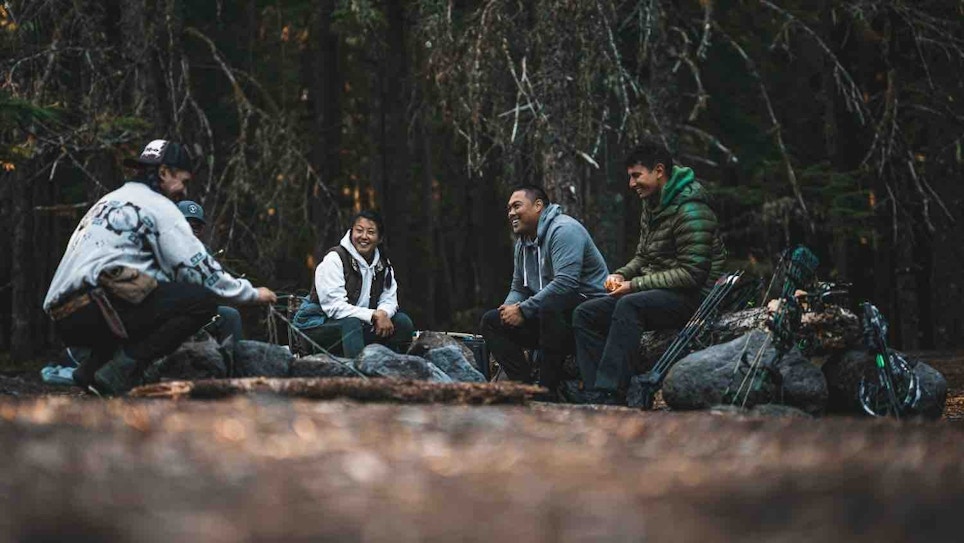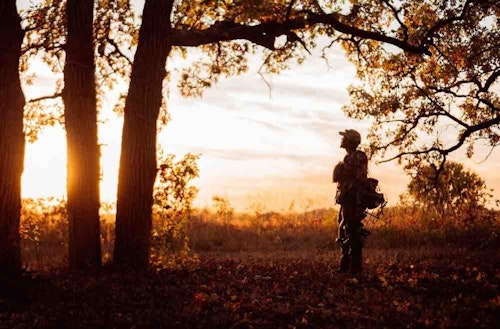
Most hunters you encounter on public lands will be pleasant, want to avoid conflict and have a positive interaction.
The man who was yelling, swearing and flinging wild hand gestures in my husband’s face was under the impression we were intruding on his spot after we pulled up next to his vehicle on the edge of a 1,000-acre piece of public land. The guy was big and angry; I could see him both above and to the sides of my husband Whitman’s muscular, 6-foot frame.
He’d immediately jumped to conclusions and assumed we’d parked there simply because he was there. We hadn’t gotten the chance to tell him we’d been hunting the area ourselves for 6 years, had never seen him there before, and already had a treestand of our own set 250 yards away. All we wanted to ask was if the guy was going north, since our stand was to the south.
Normally, Whitman and I would just go hunt somewhere else if we find another hunter made it to a spot first; it’s the ethical thing to do. But the angry man didn’t give us the chance to say that; he just got louder and more aggressive as he accused us of trying to follow him to his honey-hole.
After seeing the man’s overreaction to our presence, Whitman asked me to get back in the vehicle. As I sat there, trying to brainstorm how I’d protect my husband if the hothead became more combative, I was suddenly dumbfounded by a turn of events. After a 15-minute debate, the man bro-hugged my husband, got into his truck and drove away.
Whitman has this inhuman ability to stay calm in all situations, which is annoying when we’re arguing at home. But in that instance, it was impressive and much needed. He never raised his voice as he explained we weren’t trying to run the guy off, but were only trying to see which direction he was headed so that we didn’t interfere with his hunt.
My husband settled into the driver’s seat and upon seeing my confused expression, he said, “The guy apologized for his obnoxious behavior and admitted to having a temper and trouble controlling his anger. He realized how ridiculous he was being and is letting us hunt the area.”
Thankfully, the encounter never got physical and ended in peace, but I started to wonder, How should hunters avoid and navigate situations like these? Here’s my advice, should you experience something similar:
1. Keep Your Cool, Show Respect
I don’t know how Whitman kept his cool while being verbally attacked, but I genuinely believe his mannerisms kept us from a physical altercation. Keeping your cool is crucial to avoiding conflict. Stay calm and composed. Don’t swear, raise your voice or make assumptions when you run into another hunter. Instead, listen, talk and act like an adult to keep things from escalating during a conversation. If the other person invades your space, hold your ground and ask them to step back and keep their distance.
2. Share Your Plan, Potentially Share the Land
Discuss your hunting plan and ask them to share theirs. If you’re going in opposite directions, you might be able to share the area. Remember, there are no “dibs” on specific spots or areas on public lands. Many places have minimum distance requirements regarding how close you can set up from another hunter, but in some areas, you could legally sit 30 yards from your peer. Whether a regulation exists or not, hunting close to someone else is considered disrespectful and can be dangerous. Check the regulations for the location you’re hunting. If you both plan to go to the same area or can’t come to an agreement, the hunt preference should go to the person who arrived first.
3. Share the Facts
Most public land disputes start because someone’s being selfish or thinks they’re more entitled to hunt the land than someone else. Gently let your counterpart know the land is a public resource available to all. There are millions of acres of public land all over the country. And, through the Pittman-Robertson Act, each time you buy a license or piece of hunting equipment, you pay for public lands and financially support conservation projects that benefit wildlife and wild places. Sharing facts about public lands sets you up as an informed, educated hunter, regardless of how much hunting experience you have.
4. Have Your Game Warden on Speed Dial
If things get intense or the person doesn’t want to share the land in an area suitable for sharing, call your game warden. Wardens are there to protect hunters and wildlife, so responding to a hunter-to-hunter confrontation is within their purview. Ask them to meet you and your heated peer to discuss public land rules, regulations and boundaries. They can settle arguments and serve as a moderator in tense situations.
5. Get Their Information, Report the Incident
If things don’t seem like they’re coming to a resolution, or you didn’t call a warden for support, it’s best to pack up and head out to avoid a physical scuffle. Before you go, write down any identifying information about the person, and their vehicle. You can discreetly take photos or record heated conversations as evidence, too. Then, report the incident to a game warden who can investigate and closely monitor the property. Many state wildlife agencies have hunter harassment statutes, making it illegal to obstruct or interfere with hunters engaging in lawful activities. These laws protect law-abiding hunters from unruly peers and antihunters. As an example, most of the man’s behaviors in our story would qualify as harassment.
The number of hunters increased dramatically after the onset of COVID-19 and is still higher than previous levels. On public land, you’ll cross paths with someone afield if you haven’t already. Fortunately, most hunters you encounter will be pleasant, want to avoid conflict and have a positive interaction. Still, it’s wise to know what to do in an intense situation to protect yourself.
Images courtesy of Bowhunters United






